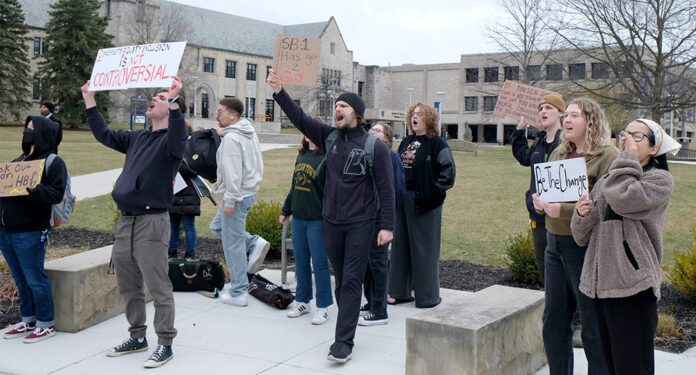TOLEDO – Political science major Ty Moussa held a Palestinian flag as he stood among nearly 175 University of Toledo students, faculty and staff who had gathered in the heart of Centennial Mall to protest SB 1.
It was March 20, and at that point, SB 1, officially known as the Advanced Ohio Higher Education Act, had passed through the Ohio House of Representatives just one day before the rally, with an expectation that Ohio Gov. Mike DeWine would sign it.
“I’m here to protest against the silencing of anybody who wants to say anything in this country,” said Moussa, originally from Lebanon. “It’s an absolute right since the foundation of this nation that we have the right to freedom of speech, the right to assemble, and the right to freedom of speech inside of our classrooms.
“It affects me by silencing me. If I’m not allowed to say what I believe in, then what’s the point of this nation’s First Amendment and the constitution?” he asked. “I think SB 1 is totally against that.”
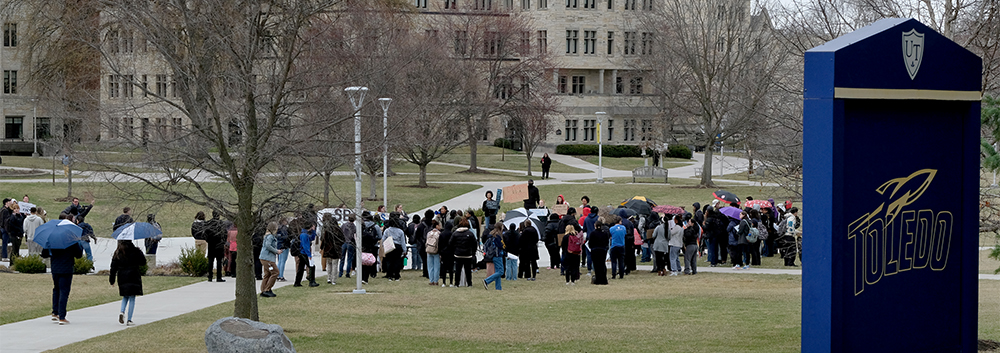

Moussa, who fears SB 1 will eliminate DEI measures, predicted that if the bill ends up becoming Ohio law, the university will yield to the government’s plans because “history has shown that universities will end up folding to the government, even if they try to fight, because they need the funding.”
University responses
One of the first universities to fold due to the Trump administration’s threat of taking away that funding was The Ohio State University (OSU). In late February, OSU President Ted Carter ordered that the university close two DEI offices and fire 16 staffers.
When the Toledo Free Press reached out to the University of Toledo (UT) for a comment on their plans for DEI, the administration “declined to comment at this time.” But it’s worth noting that the UT Office of Diversity, Equity and Inclusion ‘team’ was recently cut down to one – its director, Dr. Malaika Bell.
According to Aleiah Jones, director of UT’s Office of Multicultural Student Success, the university will abide by all state and federal laws and legislation. However, Jones said she hopes there is grace and empathy for people who are navigating through the changes universities must adhere to as they follow the law.
“I think they [students and faculty] are doing their best to inform themselves and share that information, so we saw that with the rally that they hosted,” Jones said. “They’re also supporting each other; I am really proud of the ways students are coming together to continue to grow and build each other up. We know that will continue to happen and that everyone will do their best to navigate the changes that we may face.”
Jones added that her office takes pride in being a safe and welcoming space on campus, and will continue to do so.
And as for a response to SB 1 by BGSU President Rodney K. Rogers, he penned a letter to students the same day it passed through the Ohio legislature on March 26. Here are portions of that letter:
“Today, elected representatives in the Ohio Legislature passed Senate Bill 1, which establishes broad implications for Ohio’s public institutions of higher education specific to diversity, equity and inclusion, among other topics. If you have not yet read SB1, The Advance Ohio Higher Education Act, I encourage you to do so. The bill now goes to Gov. Mike DeWine, and if signed into law, provisions will begin to take effect in 90 days.
“SB1 also codifies into state law many of our core educational principles: free speech in our classrooms, academic freedom and opportunity for all. Let me be clear – we unequivocally agree, as the bill states, that institutions of higher education should, ‘treat all faculty, staff, and students as individuals, hold every individual to equal standards, and provide those individuals with equality of opportunity, with regard to those individuals’ race, ethnicity, religion, sex, sexual orientation, gender identity, or gender expression.‘
“In the coming weeks, we will offer opportunities for members of the campus community to share their thoughts and participate in discussions regarding the implementation of SB1. I encourage you to engage in this process, as this feedback will be particularly valuable for understanding the impact of the law on the operations of the University.”
The driving force behind SB 1
The ending of DEI (Diversity, Equity and Inclusion) policies is certainly one of the driving forces behind the bill. Jerry Cirino (R-Kirkland), the bill’s sponsor, made it clear in an Ohio Senate News bulletin what his intentions were – to limit liberal bias and ban all diversity, equity and inclusion (DEI) programs, courses and mandatory training on college campuses.
“My bill will return our public universities and colleges to their rightful mission of education rather than indoctrination,” Cirino stated. “We also must return to teaching students how to think rather than what to think, and how to listen to opposing views with a respectful but critical ear.”
The evolution of DEI in the workforce was born in the late 1950s and ‘60s, when the government began moving toward federally protected equal rights for all Americans.
Title VI of the Civil Rights Act of 1964, as outlined in the Department of Justice’s Civil Rights Division website, states that “all persons must be treated equally without regard to their race, color, or national origin. People may not be excluded from participating in, denied the benefits of, or discriminated against in the programs, services, or activities of an agency receiving DOJ assistance.”
The momentum of DEI progressed over the next few decades. In 1990, the Americans with Disabilities Act (ADA) was passed, and in 2020 the Supreme Court expanded the definition of employment discrimination to include sexual orientation and gender identity.
But when President Donald Trump took office in January, that momentum came to a screeching halt. On Feb. 14, the U.S. Department of Education (which is also in danger of being shut down) ordered public universities to end all DEI programs by March 1 or risk losing federal funding.
So, with a stroke of a pen on March 28, DeWine complied and poked a hole in the safety net that many Ohio university students, faculty and staff depend on to feel safe and equal.
The bill, which becomes law 90 days after he signed it, will affect policies related to hiring practices, faculty strikes and free speech in the classroom.
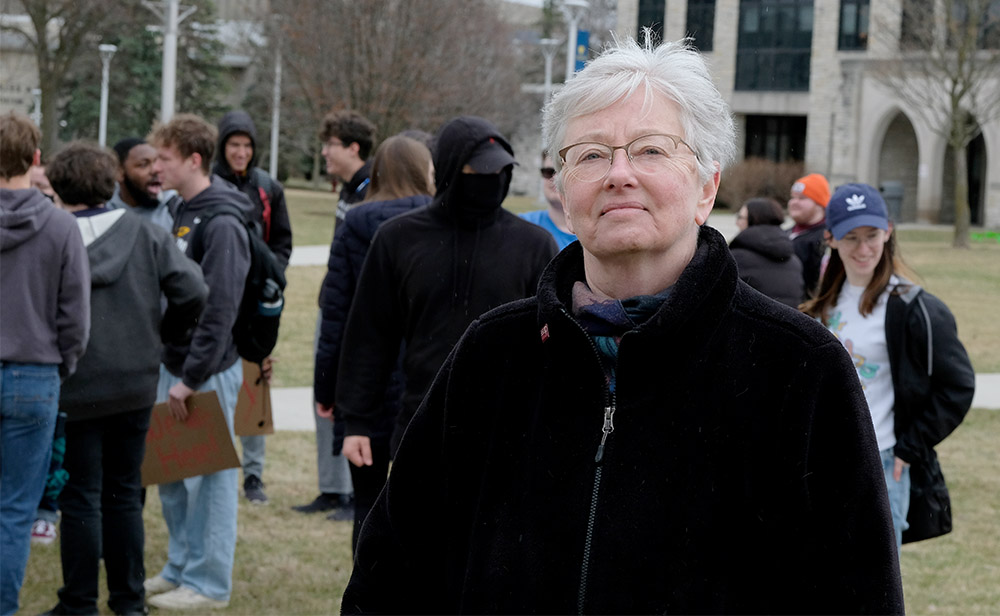
And that worries University of Toledo French teacher Dr. Linda Rouillard.
Surrounded by protestors with signs that read “SB 1 has got 2 Go,” “Looking for America” and “SB 1 is so CRINGE,” Rouillard said this bill “destroys academic freedom in our universities, and it also destroys free speech because it outlines specific topics that must not be discussed in the classroom.
“How are STEM students going to be prepared for healthcare jobs if they haven’t had discussions about the disparities between white women and black women in childbirth in the classroom?” asked Rouillard, who is involved in the faculty Senate and a supporter of UT AAUP (University of Toledo Chapter of the American Association of University Professors).
“How are they going to be prepared to deliver the best treatments for patients suffering respiratory illnesses due to climate change? Students aren’t going to come here to study in Ohio if they know this is the climate they’re walking into. I strongly oppose SB 1,” she declared.
Rouillard pointed out that despite more than 900 submitted written testimonies and 200 people showing up to the Ohio Senate hearing on Feb. 11 to testify against SB 1, as well as about 97,000 signatures on an online petition, DeWine still signed the controversial bill, which basically overhauled higher education throughout the state.
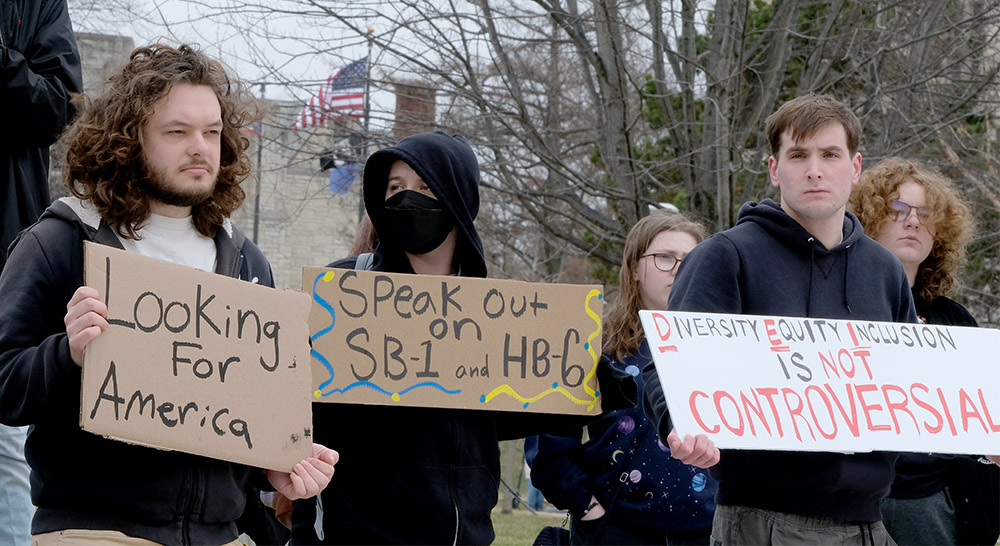
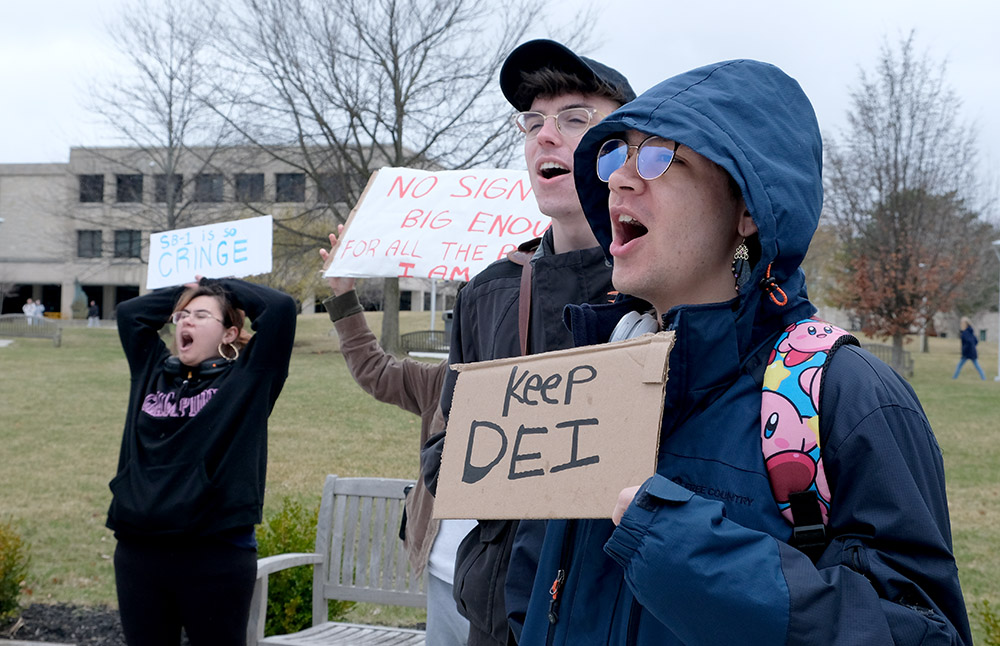
Rouillard’s fears seemed to be warranted. On Tuesday, the Trump administration froze over $1 billion in funding for Cornell University and $790 million for Northwestern University while it investigates both schools over civil rights violations.
According to an April 9 USA Today article, the administration threatened to block federal funding for schools over pro-Palestinian campus protests, as well diversity, equity and inclusion programs and transgender policies. And last Friday, the Supreme Court granted the administration’s plea to cut hundreds of millions of dollars in teacher-training money as part of its anti-DEI efforts while a lawsuit continues, according to a WTOL story.
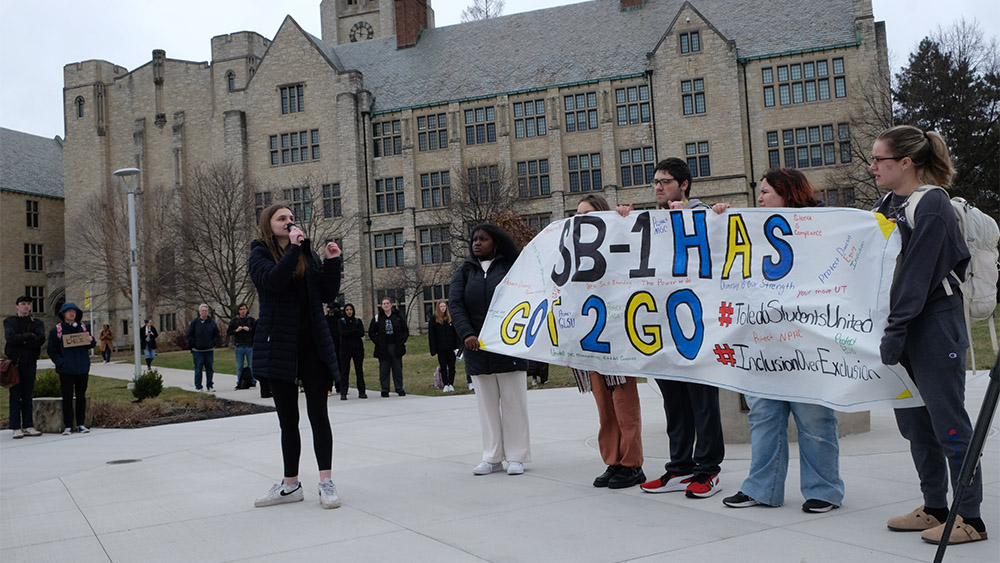
Jordan Tracy, a UToledo political science major on a pre-law track and the director of government relations for student government, said the student government planned the March 20 rally “to make sure we’re mobilizing our student body. For the fact we got about 150 to 200 students … I could not be happier with how that turned out.
“We are the ones that kind of took this project on, considering that a lot of our students on campus expressed that this was an issue they wanted to address and to make sure we’re mobilizing our student body,” Tracy said.
I think that students resonate with the message that we want the university to commit to making sure that we’re still funding and providing opportunities and supporting our diversity equity inclusion campus culture in addition to our identity-based scholarships in any speech courses that are related to that as well.
Jordan Tracy | University of Toledo director of government relations for student government.
These are a few of the changes to take effect 90 days after DeWine signed the bill:
- Syllabi posting: Instructors will be required to post the professor’s course outline for each undergraduate class beginning in the 2026-27 school year. Each document must include what topics will be covered as well as any relevant readings. Instructors must also share their qualifications and contact information. Class meeting locations or times don’t have to be included. It’s the first time this type of requirement has been broadly implemented in Ohio.
- Faculty evaluations: Annual student evaluations — already happening at most schools — now must include a question asking if the classroom atmosphere is free of political, racial, gender and religious bias.
- Post-tenure review: Faculty members who earn tenure at their universities can only be fired for cause or under “extraordinary” circumstances. It’s a big part of academic life. Tenured professors in Ohio are already reviewed by their universities on a regular basis.
- Mandatory civics course: A new three-credit course, American civic literacy, will be a requirement for those pursuing a bachelor’s degree beginning in the 2029-30 school year. Implementing this course won’t come cheap. Cleveland State University officials estimated it’ll cost about $400,000 to launch the course there.
- Speaker transparency: Institutions will create a searchable online database of any speakers who were paid more than $500. Users will need to access this information in three clicks or less from a university’s main homepage. Some campus speakers have received public pushback in recent years.
- Five-year cost reports: Universities will produce new comprehensive reports outlining their five-year costs for lawmakers to consider ahead of the state’s operating and capital improvement budgets. These detailed reports will focus on costs related to things such as student instruction and instructor and staff salaries. Institutions will also have to note how many people they employ and how much they spent on diversity, equity and inclusion “or related subjects.”
- Trustee training: Universities will work with the Ohio Department of Higher Education to create new training programs for boards of trustees. The instruction will include outlining board members’ responsibilities and reviewing current higher education trends.
New trustees will have to participate in these sessions at least once during the first two years of their term, though they can do so virtually. Current trustees will have to participate “at levels to be determined by the chancellor [of higher education],” the bill says. - Three-year program study: ODHE will conduct an in-depth feasibility study looking at if colleges could offer some bachelor’s degree programs in three years instead of four. A report must be produced within a year of the study being done. (Source: Signal Cleveland)


